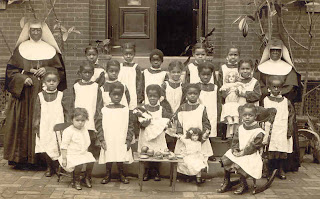As a youngster I devoured history books. There I encountered the Catholic Church with its medieval popes, bishops, saints, and sinners. When I was in my teens, I became a Catholic. Much later I had less romantic notions about the Church. As an African American, I began to appreciate the church because it was catholic, that is universal. Living in a segregated world alive with racial tension and racial hatred, I saw that the churches were segregated and often hostile to blacks and other minorities. Catholicism claimed that everyone was at home in the Catholic Church. When I looked at the world, despite the racism of some Catholics and even the segregation of many Catholic churches in the United States, I saw that men and women of diverse races were completely at home within the church. I learned about black saints, African popes, and monasticism with its roots in Africa.
Today I am a monk and still enthralled by the Catholic Church. I love the beauty of its liturgy in all its rich variety. I love the richness of Catholic spirituality in all its diversity. I love the fact that the Catholic Church can be at one and the same time authoritative in its teaching and deeply humanitarian in its social consciousness. There is room for all kinds of people in the Catholic Church; some may be only on the fringe, yet none of us are strangers. No place is foreign to the Church’s presence. Catholicism has put down roots in every culture and in almost every land.
All find their home in the Catholic Church, and the Catholic Church is at home with every people. But this breadth and inclusiveness does not only mean universality of race and culture, it also means that the church is the meeting place of saints and sinners. It is not an elite corps of the elect but a large unwieldy ship like Noah’s Ark with all kinds of people crammed in the hold trying to make it to port. Universality includes all time. The church is old and new, ancient and modern, including all times just as it includes all people.












